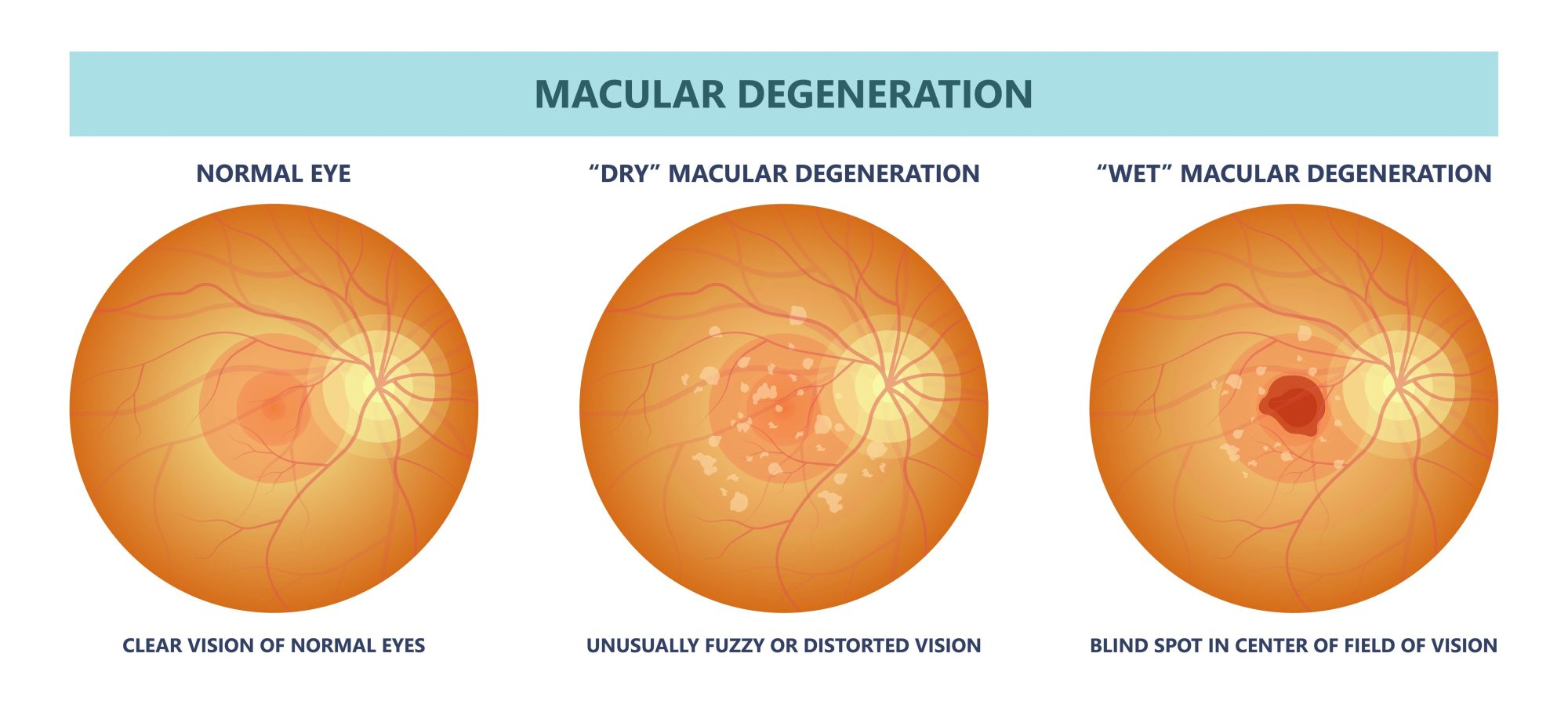Find out the common symptoms of age-related macular degeneration (AMD), the factors that put you at a higher risk of developing AMD, and the simple lifestyle changes you can make to improve and maintain your macula health.
Symptoms of AMD
AMD can cause distortion and loss of central vision while peripheral vision usually remains unaffected.
Common macular degeneration symptoms include:
- • Straight lines appear bent or wavy
- • Letters or numbers appear jumbled when reading
- • Difficulty adjusting to low light levels
- • Reduced intensity of or brightness of colours
- • Gradual decline in the ability to see objects clearly
- • Dark or empty spaces blocking the central field of vision
Risk Factors of AMD
While anyone can develop age-related macular degeneration, several factors can place you at greater risk, including:
Controllable risk factors
- o Smoking – 6x greater risk
- o Poor Nutrition – a diet high in lutein and omega-3 fatty acids can reduce the risk of AMD
- o Obesity
- o Excessive UV Exposure
Uncontrollable risk factors
- o Age over 40
- o Genetics / Family history of AMD
- o High myopia
- o Gender – AMD is more common in females
- o Fair complexion and/or light eye colour
What is Drusen?
Drusen are yellow deposits under the retina, made up of lipids and protein, and can naturally occur with age. While they do not necessarily cause macular degeneration, the presence of many drusen or large size drusen at the macula does indicate a greater risk of the development of AMD.
Varying in size, small drusen generally do not cause any noticeable vision problems and are often only detectable during a dilated eye examination with your specialist. Larger drusen and or localized detachments of the retinal pigment epithelium are much more likely to have visual impacts including distortions in vision.

Macula Health-Check – Amsler Grid
Regular comprehensive eye exams with an Optometrist or Ophthalmologist provide the best protection for the prompt detection of serious eye conditions, like AMD. However, an Amsler Grid, is a useful self-check tool that you can use at home to monitor for changes in your central vision and macular degeneration symptoms.
While the Amsler Grid is a quick sight test that you can do daily, you should not rely on it for diagnosis, and we recommend you pair your daily self-checks with regular eye examinations.
Contact us on 1800 111 374 for your free fridge magnet Amsler Grid, or you can download and print a paper copy here.
Nutrition and Lifestyle to Prevent AMD
There are many things you can do with your lifestyle and diet to care for the health of your macula that may help to prevent or delay the onset of age-related macular degeneration (AMD).
For more information you can contact the Macular Degeneration Foundation or ask your optometrist or Ophthalmologists.
Supplements and AMD
In some cases, dietary supplements may help ensure you are getting the nutrition you need.
The large Age-Related Eye Disease Study (AREDS) and ARED2 study found that specific high-dose formulations of anti-oxidant vitamins, particularly lutein and zeaxanthin, found in green leafy vegetables, can significantly reduce the risk of AMD progression and vision loss in high-risk patients.
Specific supplementations are readily available in Australia but currently, are not covered by Pharmaceutical Benefits Scheme (PBS).
Additionally, no supplement will restore vision that has already been lost, and it is not proven to benefit those with no signs of AMD or those in the very early stage of AMD.
Before taking any supplements, you may need to discuss it with your Ophthalmologist or General Practitioner, as some vitamins and minerals, can interfere with certain medications or impact other medical conditions.
Specialist Treatment for Macular Degeneration
Consultations with our specialists are available at three convenient clinic locations across the Gold Coast, fully equipped for the diagnosis, treatment and management of all eye-related conditions.